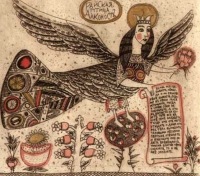Поняла, за что еще не люблю тексты про "все мы потомки палачей" (наткнулась на 100500-й на фейсбуке и вскипела).
За то, что вместо избавления от чувства вины они резким движением вгоняют в нее обратно. Нет, о сталинской эпохе надо говорить, но вот как это делать без истерики и передергиваний я, честно, не знаю.
У меня по разным семейным линиям были люди по всевозможные стороны баррикад. От "партийной шишки" до сельских учителей-беспоповцев, чьи потомки никогда не были в партии и не горели желанием туда вступать, от аристократов (по неподтвержденной семейной легенде) до участников комитетов бедноты. Есть и личные, "неполитические" скелеты в шкафу. Кое-что я застала.
И да, были моменты, вызывавшие у меня чувство вины и стыда. Мысли о том, что некоторые блага в моей жизни (в том числе материальные), нажиты ценой чужих страданий (от войн и репрессий до бедности и последних лет жизни в чужом доме). И с этим чувством мне помогали разобраться сначала умный психолог, потом умный священник. Не нести чужой крест, не отвечать за грехи покойных родственников, отбросить "дедывоевали, детиголодают, а ты тут с жиру бесишься". Радоваться, когда есть повод, а то завтра его может не быть.
А тут - "ннна тебе, потомок вертухаев, ты тут, сучка, радоваться жизни имеешь наглость, а ну-ка марш к стенке отвечать за злодеяния предков". К сожалению, мне в подобных текстах это слышно гораздо отчетливее, чем призывы к свободе. Простите, кого обидела.
За то, что вместо избавления от чувства вины они резким движением вгоняют в нее обратно. Нет, о сталинской эпохе надо говорить, но вот как это делать без истерики и передергиваний я, честно, не знаю.
У меня по разным семейным линиям были люди по всевозможные стороны баррикад. От "партийной шишки" до сельских учителей-беспоповцев, чьи потомки никогда не были в партии и не горели желанием туда вступать, от аристократов (по неподтвержденной семейной легенде) до участников комитетов бедноты. Есть и личные, "неполитические" скелеты в шкафу. Кое-что я застала.
И да, были моменты, вызывавшие у меня чувство вины и стыда. Мысли о том, что некоторые блага в моей жизни (в том числе материальные), нажиты ценой чужих страданий (от войн и репрессий до бедности и последних лет жизни в чужом доме). И с этим чувством мне помогали разобраться сначала умный психолог, потом умный священник. Не нести чужой крест, не отвечать за грехи покойных родственников, отбросить "дедывоевали, детиголодают, а ты тут с жиру бесишься". Радоваться, когда есть повод, а то завтра его может не быть.
А тут - "ннна тебе, потомок вертухаев, ты тут, сучка, радоваться жизни имеешь наглость, а ну-ка марш к стенке отвечать за злодеяния предков". К сожалению, мне в подобных текстах это слышно гораздо отчетливее, чем призывы к свободе. Простите, кого обидела.
I realized why I still don't like the texts about "we are all descendants of the executioners" (I came across the 100500th on Facebook and boiled over).
For the fact that instead of getting rid of the feeling of guilt, they abruptly drive it back into it. No, we need to talk about the Stalinist era, but honestly, I don’t know how to do it without hysteria and distortions.
I had people along different family lines on all sorts of sides of the barricades. From the "party boss" to village teachers-bespopovtsy, whose descendants have never been in the party and were not eager to join, from aristocrats (according to an unconfirmed family legend) to members of the committees of the poor. There are also personal, "non-political" skeletons in the closet. I found something.
And yes, there were moments that made me feel guilty and ashamed. Thoughts that some of the benefits in my life (including material ones) were acquired at the cost of other people's suffering (from wars and repressions to poverty and the last years of life in someone else's house). And first a clever psychologist, then a clever priest helped me to deal with this feeling. Not to carry someone else's cross, not to answer for the sins of deceased relatives, to discard "they fought, they starve, and here you are mad with fat." Rejoice when there is a reason, otherwise tomorrow it may not be.
And then - "nnna you, a descendant of guardians, you are here, bitch, you have the audacity to enjoy life, and come on, march to the wall to answer for the atrocities of your ancestors." Unfortunately, in such texts I can hear this much more clearly than calls for freedom. Forgive who you offended.
For the fact that instead of getting rid of the feeling of guilt, they abruptly drive it back into it. No, we need to talk about the Stalinist era, but honestly, I don’t know how to do it without hysteria and distortions.
I had people along different family lines on all sorts of sides of the barricades. From the "party boss" to village teachers-bespopovtsy, whose descendants have never been in the party and were not eager to join, from aristocrats (according to an unconfirmed family legend) to members of the committees of the poor. There are also personal, "non-political" skeletons in the closet. I found something.
And yes, there were moments that made me feel guilty and ashamed. Thoughts that some of the benefits in my life (including material ones) were acquired at the cost of other people's suffering (from wars and repressions to poverty and the last years of life in someone else's house). And first a clever psychologist, then a clever priest helped me to deal with this feeling. Not to carry someone else's cross, not to answer for the sins of deceased relatives, to discard "they fought, they starve, and here you are mad with fat." Rejoice when there is a reason, otherwise tomorrow it may not be.
And then - "nnna you, a descendant of guardians, you are here, bitch, you have the audacity to enjoy life, and come on, march to the wall to answer for the atrocities of your ancestors." Unfortunately, in such texts I can hear this much more clearly than calls for freedom. Forgive who you offended.
У записи 7 лайков,
0 репостов.
0 репостов.
Эту запись оставил(а) на своей стене Яна Крупина




























